|
|
|
Sort Order |
|
|
|
Items / Page
|
|
|
|
|
|
|
| Srl | Item |
| 1 |
ID:
179019
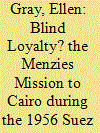

|
|
|
|
|
| Summary/Abstract |
This analysis questions the dominant view of the role played by Australian Prime Minister Robert Menzies in the early stages of the 1956 Suez Canal crisis. Tasked with the responsibility of discussing a peaceful settlement to the crisis with Egyptian President, Gamal Abdel Nasser, Menzies’ mission to Cairo failed. Previous accounts overwhelming consign the collapse to Menzies’ blind loyalty to the British Empire. However, the reasons for the negative outcome were more complex. Rather than merely acting out of devotion to Britain, Menzies also placed significant importance on United States policy, causing him to miscalculate the international political climate. Additionally, other factors like the divide between Menzies and Nasser’s ideological beliefs, Menzies’ legal background, and his wartime experiences shaped the outcome of the discussions. However, failure lays not solely with Menzies. The actions of other Powers also affected the proceedings; in particular, American and British hidden agendas and on-going Anglo-French military operations helped seal the fate of Menzies’ mission.
|
|
|
|
|
|
|
|
|
|
|
|
|
|
|
|
| 2 |
ID:
179018
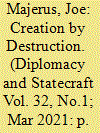

|
|
|
|
|
| Summary/Abstract |
For several decades, the atomic bombings of Hiroshima and Nagasaki in August 1945 have been the subject of a fierce debate between orthodox and ‘revisionist’ historians. In so doing, however, historians have for the most part neglected to look more closely into questions of a primarily economic and organisational nature in investigating the contributing factors to the American decision-making process. Accordingly, this analysis explores systematically how in addition to the predominant need of avoiding further combat casualties, a speedy conclusion of the Pacific conflict was also deemed critical to a successful re-transition of United States war-time production to a thriving peace-time economy, as well as to a comprehensive rehabilitation of the war-shattered European continent.
|
|
|
|
|
|
|
|
|
|
|
|
|
|
|
|
| 3 |
ID:
179021


|
|
|
|
|
| Summary/Abstract |
Libya’s ‘September One Revolution’ that initiated the 42-year-long rule of Muammar al-Qaddafi in 1969 took the United States Embassy in Tripoli completely by surprise. American diplomats had long anticipated a coup d’état; however, no one expected it to be led by a small group of young, unknown army officers. American officials in Libya and the United States argued for months over who was in charge of the new government and the direction it would take. Was this simply a coup d’état or the beginning of a deeper socio-economic and political revolution? The failure of American diplomats to understand better the One September Revolution from the start led to policy decisions that would affect bilateral relations for years to come.
|
|
|
|
|
|
|
|
|
|
|
|
|
|
|
|
| 4 |
ID:
179023
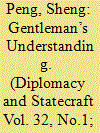

|
|
|
|
|
| Summary/Abstract |
British, French, and German Dual-Use Technology Transfer to China and America’s Dilemma during the Carter Administration, 1977-1981
|
|
|
|
|
|
|
|
|
|
|
|
|
|
|
|
| 5 |
ID:
179020


|
|
|
|
|
| Summary/Abstract |
The mid-1960s to the mid-1970s were watershed years during which Japan made crucial decisions about its non-nuclear policies by interacting with the emerging nuclear non-proliferation regime. The decision to join the Nuclear Non-Proliferation Treaty [NPT] generated tense debates amongst elite foreign policy officials, politicians, and the nuclear industry. This analysis explores their relationships and examines why Japan honoured its commitment to the non-proliferation regime. Following a micro-level analysis of archival evidence, in the face of uncertainty and disagreement regarding adherence to nuclear non-proliferation rules and norms, Japanese concerns over diplomacy and the domestic economy became key considerations in Tokyo’s decision-making process around its non-nuclear policy until ratification of the NPT in 1976. Although focusing solely on Japan, this examination’s findings may provide insight into other nations’ non-nuclear policies based on economic and political, rather than military or security, incentives and suggests scope for further research in the field of nuclear non-proliferation.
|
|
|
|
|
|
|
|
|
|
|
|
|
|
|
|
| 6 |
ID:
179017


|
|
|
|
|
| Summary/Abstract |
British and Italian representatives signed a series of accords, commonly called the Easter Accords, on 16 April 1938. The various agreements aimed to settle several outstanding issues between the two governments and, on the surface, it appeared that both Powers had committed to observe the status quo in the Mediterranean. Two years later, however, fascist Italy and Britain were at war. This analysis argues that Italian foreign policy had three over-arching goals that led Rome to sign the Accords. It wanted to secure definitive British de jure recognition of the Italian conquest of Ethiopia and recognition that Italy was an equal empire with rights in the Mediterranean and Red Sea basins. Benito Mussolini, the Italian dictator, wanted to isolate France from its potential British ally. Italian diplomats and officials also thought that they could use the negotiations to weaken the influence of Anthony Eden, the British foreign secretary. The limited, tactical scope of Italian policy meant little chance existed of reaching a genuine rapprochement.
|
|
|
|
|
|
|
|
|
|
|
|
|
|
|
|
| 7 |
ID:
179022
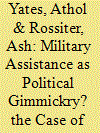

|
|
|
|
|
| Summary/Abstract |
What motivates states to provide others with military assistance? Traditional explanations naturally focus on the security interests of the sender state. But could domestic considerations – intra-party politics, for example – also be a factor in some cases? This analysis, which examines the British decision to send a Military Advisory Team [MAT] to the newly federated United Arab Emirates [UAE] in 1971, answers in the affirmative. It demonstrates that the MAT was primarily, albeit not exclusively, a means by which the British government of Prime Minister Edward Heath could stave off sharp criticism from fellow Conservative politicians that under his leadership that Britain was cutting and running from its overseas responsibilities. Furthermore, because the MAT was in inception a political tool, its military utility in assisting the UAE, or the influence Britain derived from its presence, was minimal at best and counterproductive at worst.
|
|
|
|
|
|
|
|
|
|
|
|
|
|
|
|
| 8 |
ID:
179016
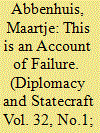

|
|
|
|
|
| Summary/Abstract |
The Hague conferences of 1899, 1907 and the one not held in 1915 occupy an uncomfortable place in the history of war, peace, and diplomacy. Siloed in a range of sub-disciplines, historians often evaluate the conferences in terms of their relative ‘success’ or ‘failure’. Where diplomatic historians generally marginalise the political relevance of the conferences in explaining the march to global war in 1914, legal historians mobilise The Hague as a point of origin for the expansion of international humanitarian and human rights law and the law of war. Peace historians prefer to explain the relative weakness of pre-1914 transnational peace activism, whilst historians of global governance describe The Hague as a starting point for twentieth century multilateralism. Rarely do these histories speak to each other, which leaves their largely oppositional findings floating freely, untethered to either each other or the complex context in which The Hague’s conferences, conventions, and institutions evolved. In response, this analysis argues for the historical need to re-tether these Hague developments to the context of the time in which they first appeared, thus helping to shape a more nuanced understanding of their on-going political and legal relevance as well.
|
|
|
|
|
|
|
|
|
|
|
|
|
|
|
|
| 9 |
ID:
179024


|
|
|
|
|
| Summary/Abstract |
This commentary asks why Russia has started again to invest in land-based intermediate-range missiles, which can be used both in conventional and nuclear roles. As resorting to the action-reaction scheme cannot explain Russian efforts, the nature of the specific Russian approach towards military issues requires consideration. Russia obviously seeks to achieve major strategic advantages in case of a regional war occurring in Europe by having available a capability for escalation dominance. Only Russia can initiate such a war, not the North Atlantic Treaty Organisation [NATO]. The Western Alliance should respond by improving the conventional defence capabilities with which it is going to protect particularly the Baltic States and Poland. Moreover, NATO will have to review its nuclear posture in Europe.
|
|
|
|
|
|
|
|
|
|
|
|
|
|
|
|
|
|
|
|
|